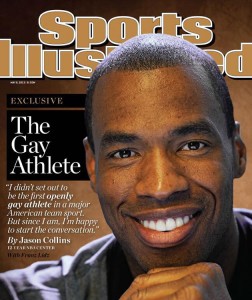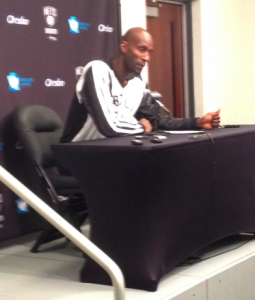 Before getting hitched, I lived with my future wife for a few months, then we were engaged for about a year and a half.
Before getting hitched, I lived with my future wife for a few months, then we were engaged for about a year and a half.
We were told over and over: “It’ll be different when you’re married.” Then the day came, and guess what?
Our routines were the same. We treated each other just as we had before. In that sense, absolutely nothing was different.
But around us, context changed. People viewed our relationship differently. Making the bond official added a layer of obligation to each other legally and morally that, in subtle ways, altered the context of the relationship.
Context matters.
Experiencing Sunday’s game at Staples Center between the Lakers and Nets felt similar. What would otherwise have been a relatively insignificant game became something more earlier in the day when Brooklyn announced the signing of Jason Collins, making him the first openly gay player in one of America’s big four sports. The inevitability of this day has been apparent for a long time, even before Collins told Sports Illustrated last year he was gay. If he didn’t get another shot to play – a reasonable possibility given his age and limited skill set – someone else would, eventually.
Still, everything about an openly gay athlete has been, to this point, hypothetical.
Now, it’s real, and so the context of this discussion evolves. There is now an openly gay athlete on the floor and in the locker room. Just as important, there is now a group of athletes who are the first teammates of an openly gay man. In many ways the story is about them and how they react as much as it is about Collins. When people ask if the NBA, NFL, or another major American sport is “ready” for a gay player, they’re not talking about the gay athlete himself, but the guys he plays with.
At the very least, the match between Collins and Brooklyn seems a good one. He’s played with or against most of the Nets’ aging roster, and was a teammate of Jason Kidd for years. These are people for whom Collins’ reputation and track record have weight. Brooklyn has Kevin Garnett, who didn’t play Sunday but is among the most fiercely loyal teammates the league has ever seen. Moreover, the same limitations making Collins less appealing to teams at the start of the season are more of an asset as the calendar hits March. Brooklyn isn’t trying to plug in a high-scoring player from the D-League or integrate someone in a trade who will have to radically change his role.
Instead, Collins knows exactly who he is as a player. His teammates know it, too. “It makes it easier for sure, as a coach or a teammate, or a player for his role and what his tools (are) and what he brings to the table – his toughness, his rebounding, his ability to defend and just keep the game simple. Understanding that, it’s easy to coach and also for a teammate, that’s easy to play with,” Kidd said before the game.
“He has to be himself.”

Meaning a guy who can accept DNP-CD’s between appearances, who won’t ask for the ball, who will set effective screens and deliver hard fouls. He’ll only enhance an already veteran leadership structure. On his first night in black and white, his teammates basically went Talking Heads on the media. Everything in Brooklyn’s locker room, they said, was same as it ever was.
How much Collins truly impacts Brooklyn’s bottom line is a tough thing to guess – in the grand scheme of things, probably not all that much – but he obviously didn’t hurt their chances Sunday. The Nets were eight points better during the 11 minutes Collins was on the floor (though it’s fair to say any positive statistic earned against the Lakers ought to be taken with a side of salt grains). Brooklyn is short on bigs following their deal for Marcus Thornton and injury to Garnett, and for the next nine days, at least, can use Collins to help fill that void.
That’s his role on the floor. Off it, the significance of Collins and the moment was undeniable. Put together, there was a sort of surreal disconnect. A sense of elevation in atmosphere that didn’t actually penetrate the game itself.
Most big basketball stories have a tangible hook. Something that can be observed in a team’s performance, whether by the actions of a player or the decisions of a coach. This wasn’t one of those situations. Collins’ impact can be measured, yes, but he’ll only be playing short minutes, if at all. Any sample sizes are likely to be low.
It’s easy to forget, given how long the topic has been on the table, that what Collins did Sunday wasn’t the start of the conversation for fans, players, and media alike, but it’s closer to the beginning of it than the end. He’s done his part. It’s about how the rest of us react, and in that respect results won’t be fully seen in real time. Rare will be the player, on Brooklyn or somewhere else, willing to criticize Collins, whether he “approves” or not because the repercussions would be swift and harsh (in the court of public opinion, if nothing else).
So we’ll truly know in weeks or years as Collins plays and perhaps empowers other athletes to come out exactly how much the Nets locker room might have changed, and the degree to which that locker room and the NBA culture more broadly required an upgrade. Like many, I hope a percolating narrative that pro athletes don’t care about a teammate’s sexuality so long as he can help them win games is the truth, as opposed to naivety. That’s my sense, but I’ve never been an athlete in a pro locker room.
In reality, those most impacted by Collins are likely to be far from the NBA. People we’re not asking in places we’re not looking.
Collins wants to be seen as a basketball player first and foremost, but is acutely aware of the historical significance represented in his return. I asked him how he thinks this story should be treated.
“I understand you guys have a job to do, and I do understand that there is a significance. But at the same time, there are other athletes – (soccer player) Robbie Rogers, Michael Sam, male athletes who are active. I’m looking forward to the day Michael gets out there on the football field. The (Los Angeles) Galaxy season is coming up pretty soon. And female athletes, starting with Martina Navratilova, Billie Jean King, and the list goes on and on, now to Brittany Griner. All of us, it’s about being an athlete. It’s about going out there and winning, competing, working hard,” Collins said.
“That’s what it’s about.”
And that is the proper context.
Onto the rankings.